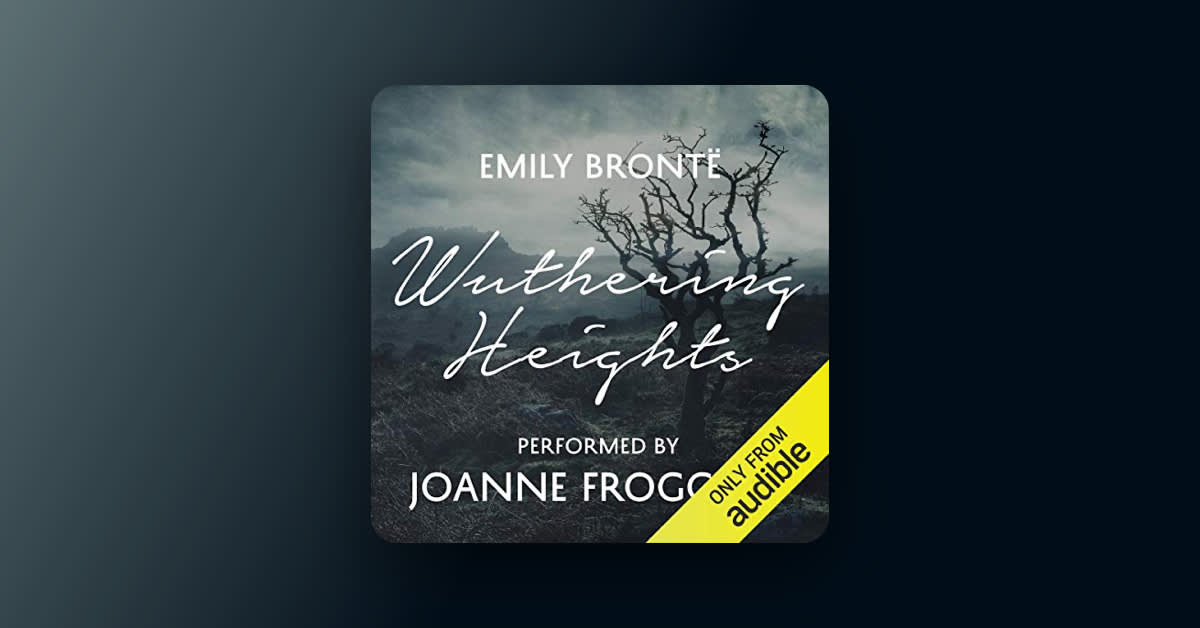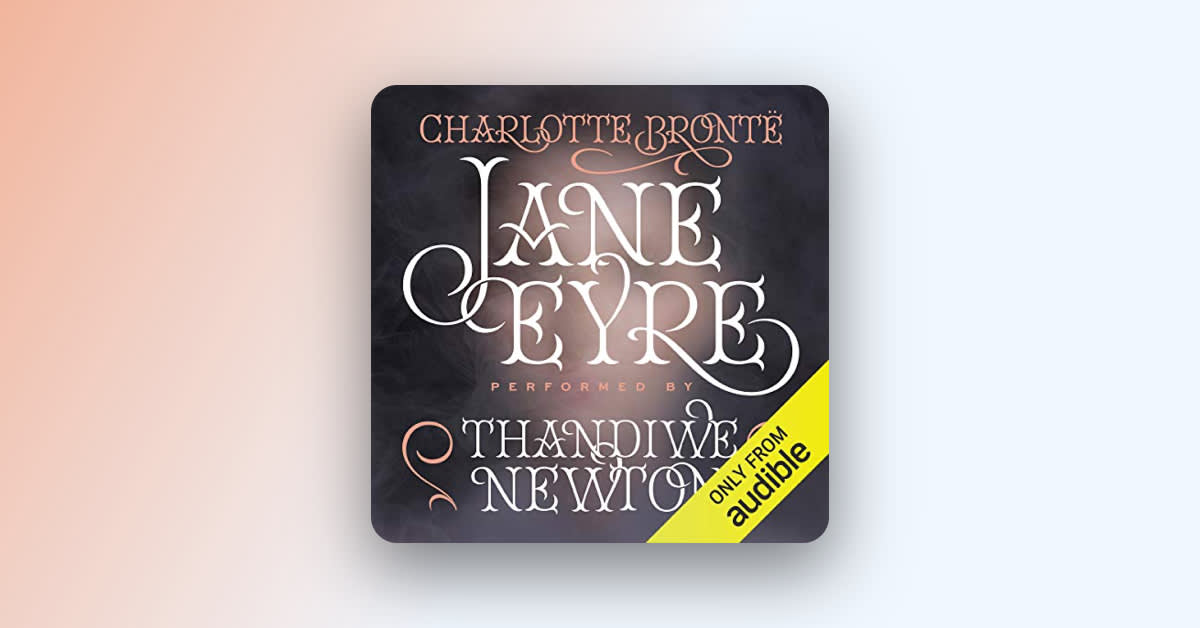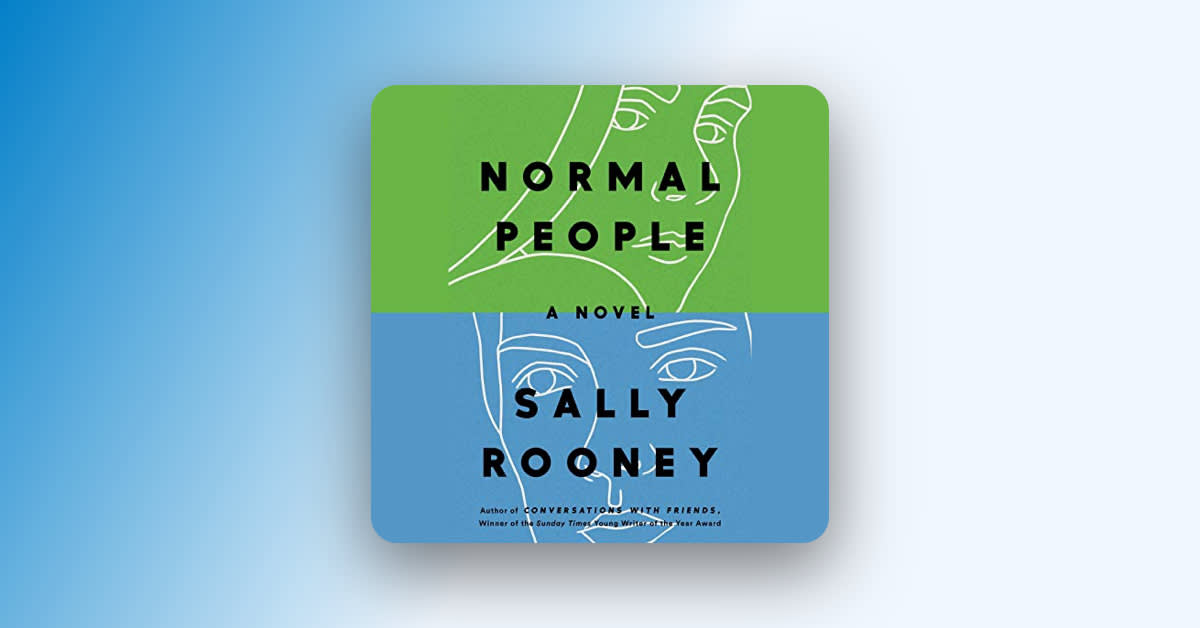Why it’s essential
With its rich language, atmospheric setting, and complicated, three-dimensional characters—brought to life in all their passion and flaws in an award-winning performance by British actress Joanne Froggatt—this literary classic from Emily Brontë is truly unforgettable.
Featured in the 20 best classic audiobooks to listen to.
What is Wuthering Heights about?
Set in the Yorkshire moors against the backdrop of 19th-century English society, Wuthering Heights centers on Catherine and Heathcliff, following both their tumultous love story and a relentless quest for validation and revenge.
Editor’s review
Mysia is a book person who loves escaping into twisty mysteries, dramatic family sagas, and contemporary fiction driven by complicated characters.
As a feminist with a passion for novels about complicated women written by brilliant women, I have always been fascinated by the Brontë sisters. Now universally acknowledged as literary geniuses, Charlotte, Emily, and Anne grew up in poverty and isolation in a parsonage in rural England, suffered the tragic early losses of their mother and two older sisters, struggled with their volatile alcoholic (and possibly opium-addicted) brother, and, sadly, died of illness young (Anne at 29, Emily at 30, and Charlotte at 38). What’s more, to get their writing taken seriously in the mid-1800s, these gifted women had to publish their novels under pseudonyms—Currer, Ellis, and Acton Bell—so that critics and readers would assume they were the work of men.
Ever since my first encounter in high school, I have been a fan of Charlotte Brontë’s Jane Eyre. But I only recently read Emily Brontë’s masterwork, and only published novel, Wuthering Heights. From a young age, I knew the story (or, at least, part of it) from seeing the 1939 film. As a ‘tween way back in the pre-streaming days, I often scoured late-night TV listings for classic movies, and once stumbled upon Wuthering Heights. This acclaimed adaptation stars Merle Oberon—a rare beauty and remarkable actress—as Catherine Earnshaw, and she’s wonderful in the role. What kept me enthralled, however, is the character of Heathcliff, played by a young, hunky, and brooding Laurence Olivier. (Yes, the same actor who, decades later, played the sadistic Nazi torturer in Marathon Man.)
A few years ago, I revisited my beloved Jane Eyre through an audiobook, impeccably performed by Thandiwe Newton, and discovered deeper layers and strikingly relevant themes. Afterwards, I started thinking it was time to finally dive into Wuthering Heights. The audiobook is narrated by Joanne Froggatt, widely known as Downtown Abbey’s Anna Bates, which made reading with my ears the most appealing option.
While people tend to think of Wuthering Heights as a romance, it defies the genre’s defining expectation—a happily-ever-after ending. Yes, it features a thrilling love story between Heathcliff and Catherine, but that’s only the first half of the book (which many film adaptations, including the 1939 classic, present as the whole story). The second half of the book is about what happens after (spoiler alert!) Catherine’s death. In terms of its intense mood, its atmospheric setting (two grand estates, both situated on the wild, desolate moors of Yorkshire), and its supernatural elements, Wuthering Heights is pure gothic. And its primary focus isn’t forbidden passion or unrequited love—it’s Heathcliff’s quest for revenge.
Wuthering Heights revolves around two families: the Earnshaws, who live at Wuthering Heights with their two children, Hindley and his younger sister, Catherine, and the Lintons, who live at Thrushcross Grange, four miles and a world away, with their two children, Edgar and his younger sister, Isabella. So, who is Heathcliff? When the novel opens, in the winter of 1801, he’s a bitter, lonely old man, despite his wealth, and the owner of both estates. Heathcliff’s story is told to Lockwood, a man who rents Thrushcross Grange and is curious about his dour landlord, by the manor's housekeeper, Nelly Dean. It’s an unusual narrative structure, particularly for a novel published in the 19th century, and to my mind, it adds to the mystery of Heathcliff, since we only learn about him from others’ observations and accounts of his often outrageous behavior. In her younger days, Nelly worked as a servant at Wuthering Heights, which is where she first met Heathcliff, and where the story really begins.
Warning: the following plot synopsis contains major spoilers for Wuthering Heights.
One day, upon returning from a business trip to Liverpool, Mr. Earnshaw brings home an unusual surprise—an orphan boy—and declares his intent to raise him with his own children. Hindley detests the unrefined, dark-skinned stranger, but, after her initial wariness, Catherine opens her heart to Heathcliff. Before long, Catherine and Heathcliff become inseparable. After his wife’s death, Mr. Earnshaw increasingly dotes on Heathcliff, and Hindley takes out his resentment, verbally and physically, on the "son" his father prefers. To protect Heathcliff, Mr. Earnshaw sends Hindley away to school. Yet, when Mr. Earnshaw dies three years later, it is Hindley who inherits Wuthering Heights, and he returns home with a wife and a vengeance. Heathcliff, no longer the chosen one, is treated like a common, low-class laborer. He and Catherine remain close, however, and their affection blossoms into love. While exploring the moors together one evening. they wander over to Thrushcross Grange. Their adventure is disrupted when Catherine gets bitten by a dog. After insisting that she stay at the manor to recuperate, Mrs. Linton sets out to make the motherless, free-spirited Catherine a proper young lady. By the time she returns home five weeks later, Catherine has become infatuated with English society and the gentlemanly Edgar—and that complicates her relationship with Heathcliff.
Believing he has been spurned by Catherine, even though she still loves him, and fed up with being abused by Hindley, Heathcliff leaves Wuthering Heights with a burning goal: to become a rich and respected gentleman. Three years later, and shortly after Catherine marries Edgar, Heathcliff returns, armed with a mysterious fortune and set on getting revenge. He dupes the drunken, already debt-plagued Hindley into borrowing money from him and woos Isabella Linton into marrying him, thus placing himself in line to inherit both Wuthering Heights and Thrushcross Grange. Before long, he begins to treat Isabella cruelly, and violently, while pining for his true love, Catherine, who is expecting her first child. When Catherine dies, shortly after giving birth to a daughter, Heathcliff begs her spirit to remain on Earth—urging her to haunt him, to drive him mad, to take any form she wants, just as long as she never leaves him.
This is where the 1939 movie (and most adaptations) ends—but Emily Brontë continued the tortured family saga into the next generation. Shortly after Catherine’s tragic death and Heathcliff’s grief-fueled madness, Isabella flees to London and gives birth to Heathcliff’s son, whom she names Linton after her family. Picking up the story when Catherine and Edgar’s daughter is 13, the second half of the book focuses on Cathy Linton and her relationships with Heathcliff, with Heathcliff’s son, Linton, and with Hindley’s son, Hareton. Heathcliff persists in his quest for revenge and his callous treatment of others, especially the three young people who, through twists of misfortune, come to depend on him. Gradually, Heathcliff becomes obsessed with the memory of Catherine, speaking to her ghost while wandering the moors. He dies longing to be reunited with his one true love. In the end, Cathy and Hareton are the sole survivors of the troubled Earnshaw and Linton families, and, considering the loss and hardships they’ve endured throughout their lives, we can only wish them a future filled with contentment and peace.
Heathcliff is far from a hero, and Catherine has her flaws too. He’s vengeful; she’s spiteful. Their relationship is tempestuous and heartbreakingly tragic. Yet Wuthering Heights endures partly because they’re both human. Emily Brontë was a trailblazer in taking on issues from classism and racism to substance abuse and domestic violence. There are times throughout the novel where you’ll hate Heathcliff—especially for the way he treats his adoring wife, Isabella, and his sickly son, Linton, and both Hareton and Cathy, the daughter of the only woman he has ever loved. But even if you, like me, can’t excuse his cruelty, you’ll come to understand the roots of his rage—abandonment, rejection, disenfranchisement, and terrible loss—and feel sympathy for him.
Was Heathcliff the secret, illegitimate son of Mr. Earnshaw? Would he have been a loyal brother if Hindley hadn’t beat him up and down? Would he have been a devoted, loving husband to Catherine if she hadn’t let her desire for social advancement overtake her heart? Was Heathcliff born to be a callous brute or did circumstances turn him into one? Emily Brontë left us a lot to think about, and that’s why this 19th-century novel remains so engrossing and haunting.
As an added bonus, the audiobook features an introduction written by Ann Dinsdale, Chief Curator of the Brontë Museum, which puts the novel into historical perspective and offers insights into its author. Froggatt won the 2017 Audible UK Narrator of the Year Award for her brilliant performance of Wuthering Heights. Beyond making the characters come alive, she provides an element of persuasiveness that makes even their most outlandish actions seem completely justified.
Content warning: Wuthering Heights contains domestic violence and physical abuse.
Did you know?
Emily Brontë is widely believed to have based Wuthering Heights on an actual place, Top Withens, an isolated farmhouse, situated on a windswept hill overlooking the valley, near Haworth, West Yorkshire, England. It's now a well-known tourist destination. Sylvia Plath wrote the poem "Wuthering Heights" about visiting Top Withens.
In 1847, after being rejected by publishers, Emily and Anne paid the considerable sum of 50 pounds to publish Wuthering Heights and Agnes Grey together in one volume under male pseudonyms. After its initial release, Wuthering Heights largely received negative reviews for its savage, immoral characters and depiction of physical acts of cruelty.
In 1850, Charlotte put out a revised edition of Wuthering Heights, with a preface that revealed the author to be a woman. Along with removing typos and altering the Yorkshire dialect, Charlotte tackled criticism of the passion and violence portrayed in the novel. Painting her sister as a "nursling of the moors," or wild child, she also suggested that Emily didn’t know what she was doing when she was writing, for she had a creative gift that “strangely wills and works for itself.” Though Charlotte meant well, she created myths about Emily that still persist.
"Wuthering Heights" is also the name of a hit song, written and recorded by Kate Bush. The lead single on her 1978 debut album, it rose to #1 on the UK's official singles chart. Bush penned the song, when she was just 18, within a few hours late at night after watching a BBC adaptation of the novel. It's sung from the perspective of Catherine, pleading at Heathcliff’s window to be allowed in. As Bush later discovered, she and author Emily Brontë share a birthday: July 30.
What listeners said
"You won't regret giving this version of Wuthering Heights a listen. Trust me. And I'd be willing to bet that if you were never the biggest fan of this dark, brooding, Victorian Gothic classic but were thinking of giving it another try, that this version and Joanne Froggatt's performance will make you a fan." –Brian, Audible listener
"I never read Wuthering Heights and I came across this version narrated by Joanne Froggatt of Downton Abbey fame. She is utterly amazing, breathing life into this dark classic." –Lynne, Audible listener
"This is a dark, brooding story, but Joanne Froggatt is wonderful reading it. The voices for different characters were very effective, almost as if performed by a whole cast." –Reader31, Audible listener
"The narrator was incredible. A perfect performance of a classic novel dear to my heart." –Lauren, Audible listener
Quotes from Wuthering Heights
"I wish I were a girl again, half-savage and hardy, and free."
"Treachery and violence are spears pointed at both ends; they wound those who resort to them worse than their enemies."
"I have not broken your heart—you have broken it; and in breaking it, you have broken mine."
"He's more myself than I am. Whatever our souls are made of, his and mine are the same."
"If all else perished, and he remained, I should still continue to be; and if all else remained, and he were annihilated, the universe would turn to a mighty stranger."
Adaptations
Wuthering Heights has been adapted numerous times for film, the stage, and television. Following are a few notable screen adaptations:
1939, a Samuel Goldwyn movie, directed by William Wyler, starring Laurence Olivier and Merle Oberon, which won the New York Film Critics Award for Best Film and was nominated for eight Academy Awards.
1967, a BBC-TV miniseries, starring Ian McShane and Angela Scoular, which provided the inspiration for Kate Bush's hit song.
1992, a movie, directed by Peter Kosminsky, starring Ralph Fiennes and Juliette Binoche, which brings the entire novel, not just its first half, to life. This film also memorably features an introduction and voiceover from Emily Brontë, played by Sinead O’Connor.
2003, an MTV-produced modern adaptation, starring Erika Christensen as Cate and Mike Vogel as Heath, in which the characters sing original songs. It's based on an original screenplay by Jim Steinman, who has credited Wuthering Heights as the inspiration for his megahit power ballad, "It’s All Coming Back to Me Now," performed by Celine Dion.
2009, an ITV two-part miniseries starring Tom Hardy and Charlotte Riley, displaying great chemistry. They married in 2014 and have two children together.
About the author
Emily Brontë was an English writer and poet. Born in 1818, she was the second youngest of her siblings and the most reclusive. Aside from studying in Brussels for a year, she rarely left home and her beloved Yorkshire moors. Her best friend was her younger sister, Anne. Her only published novel, Wuthering Heights was first published in London in 1847 to mixed reviews; some critics were puzzled by the novel’s innovative structure while others were scandalized by its violence and passion. She died of tuberculosis one year later, at age 30.
About the performer
Joanne Froggatt is a British stage and screen actress who rose to fame for her portrayal of Anna Bates in the ITV period drama Downton Abbey (2010-2015), for which she received three Emmy nominations for Outstanding Supporting Actress in a Drama Series and won the Golden Globe Award for Best Supporting Actress on Television. From 2017 to 2020, she starred in the ITV series Liar. She won the British Independence Film Award for Most Promising Newcomer for her leading role in the 2010 film In Our Name. In addition to her brilliant performance of Wuthering Heights, for which she won Audible UK’s 2017 Narrator of the Year Award, she shines as the narrator of Audible's 2017 Thriller of the Year, Silent Child.










